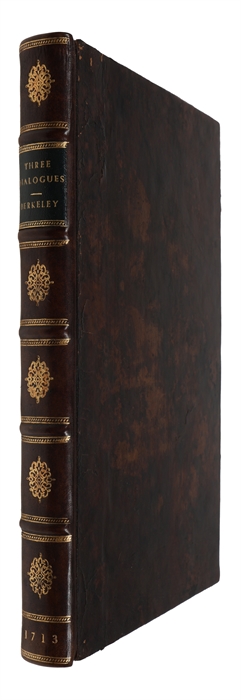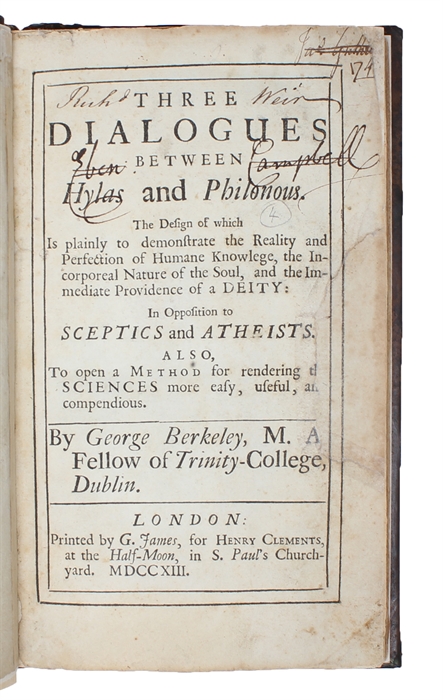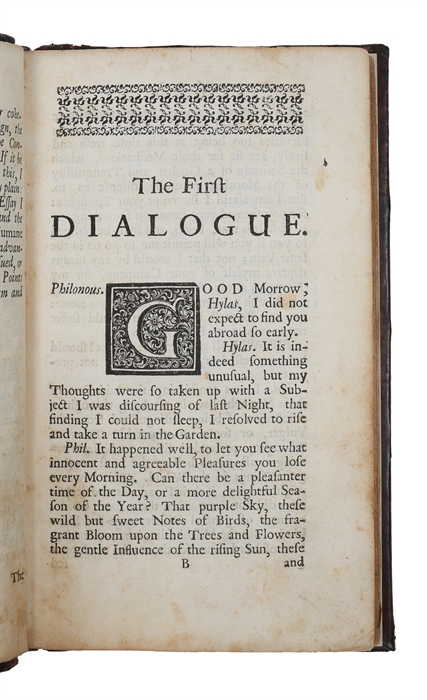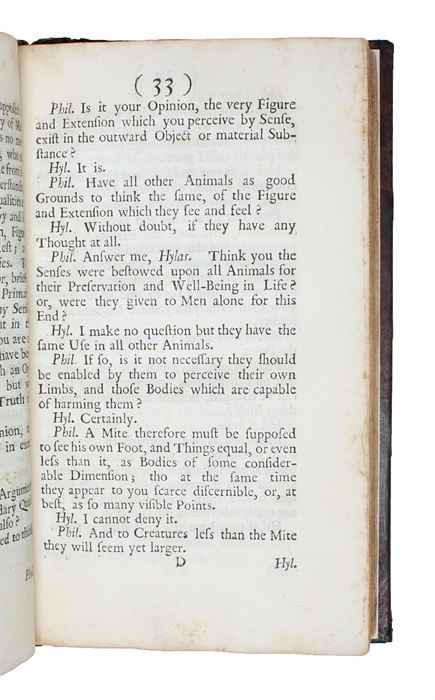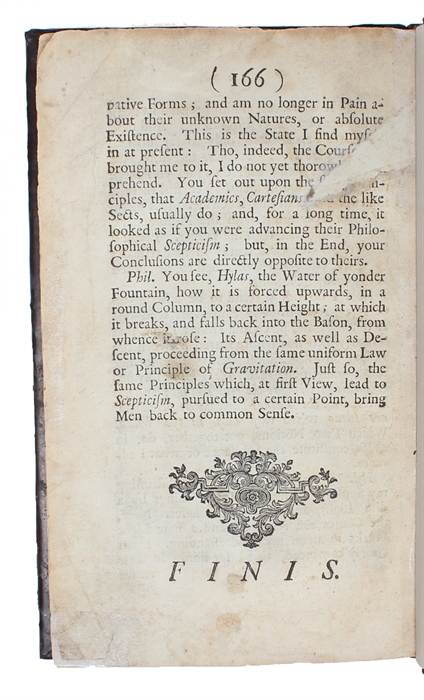THE PERCEPTUAL RELATIVITY
BERKELEY, GEORGE.
Three Dialogues between Hylas and Philonous. The Design of which Is plainly to demonstrate the Reality and Perfection of Humane Knowledge, the Incorporeal Nature of the Soul, and the Immediate Providence of a DEITY: In Opposition to Sceptics and Atheists. ALSO, To open a Method for rendering the SCIENCES more easy, useful, and compensious.
London, Printed by G. James, for Henry Clements, 1713.
8vo. Contemporary marbled full calf boards, prettily rebacked in period style with gilt title-label, raised bands and gilt ornamentations to spine. During the re-backing, new end-papers have been inserted, but the original front end-paper , containing old owners' inscriptions, has been preserved and is still withbound. Three old owners' names to title-page, two of them crossed out. The title-page had been repaired at the outer margin, affecting three letters in the last three lines of the subtitle (To open a Method for rendering the/ SCIENCES more easy, useful, and/ compensious), namely the "he" in "the" and the "d" in "and" as well as part fo the double-ruled border, which has been drawn up again. The final leaf with a somewhat crode repair causing loss of some words towards the hinge. A small hole in A3, not repaired. A bit of brownspotting, mostly at beginning and end. With its flaws, still and overall acceptable copy of this extremely rare title. (10), 166 pp.
The very scarce first edition of Berkeley's other magnum opus, his great work of metaphysics, second in importance only to his "Treatise Concerning the Principles of Human Knowledge" (1710). The present work is not only a popularized version of the "Treatise", though it is a fact that it was more widely studied and more easily understood - being written as an almost Platonian dialogue between Hylas (Greek for "matter" - thought to be the representative for John Locke) and Philonous (Greek for "the lover of reason" - Berkeley's spokesman) - it also constitutes a thorough and elaborated explanation of Berkeley's central ideas and the emergence of many of the principal thoughts that we now associate with him and his anti-materialist philosophy.
"In this Treatise, which does not presuppose in the Reader, any Knowledge of what was contained in the former (i.e. the "Treatise"), it has been my Aim to Introduce the Notions I advance, into the Mind, in the most easy and familiar manner; especially, because they carry with them a great Opposition to the Prejudices of Philosophers, which have so far prevailed against the common Sense and natural Notions of Mankind.
If the principles, which I here endeavour to propagate, are admitted true; the Consequences which, I think, evidently flow from thence, are, that Atheism and Scepticism will be utterly destroyed, many intricate Points made plain, great Difficulties solved, several useless Parts of Science retrenched, Speculation referred to Practise, and Men reduced from Paradoxes to common Sense" (Preface, pp. (7-8)).
In the present work, Berkeley, one of the greatest thinkers of early modern philosophy, sets out to alter the direction of philosophy and set straight the boundaries of man's knowledge of himself and the world around him. He seeks to bring back man to common sense and to bring back science and knowledge to that which is essential and factual. In the present work he famously defends the idealism, because of which he is still considered one of the greatest metaphysicians ever. As his "Treatise" is remembered today for the famous phrase "Esse est percipi" - to be is to be perceived - so his "Dialogues" is remembered for the introduction of the perceptual relativity argument (stating that the same object can have different characteristics, e.g. shape, colour, etc., depending on the perspective of the observer, e.g. distance, angle, light, etc.).
Furthermore, as Berkeley had used God in the "Principles" as the CAUSE or originator of our ideas of sense, in the "Dialogues" he brings God a very important step further, stating that our ideas must EXIST IN God when not perceived by us, thus seeing this as the warrant for the continuity of our ideas (God being unchanging). This leap (from claiming that God must cause our ideas to claiming that our ideas must exist in God) that Berkeley thus takes in the "Dialogues" is among the most important within his philosophy, guaranteeing continuous existence to physical objects.
The work is considered the foremost representative of Berkeley's phenomenalism.
"George Berkeley, Bishop of Cloyne, was one of the great philosophers of the early modern period. He was a brilliant critic of his predecessors, particularly Descartes, Malebranche, and Locke. He was a talented metaphysician famous for defending idealism, that is, the view that reality consists exclusively of minds and their ideas. Berkeley's system, while it strikes many as counter-intuitive, is strong and flexible enough to counter most objections. His most-studied works, the Treatise Concerning the Principles of Human Knowledge (Principles, for short) and Three Dialogues between Hylas and Philonous (Dialogues), are beautifully written and dense with the sort of arguments that delight contemporary philosophers. He was also a wide-ranging thinker with interests in religion (which were fundamental to his philosophical motivations), the psychology of vision, mathematics, physics, morals, economics, and medicine. Although many of Berkeley's first readers greeted him with incomprehension, he influenced both Hume and Kant, and is much read (if little followed) in our own day." (SEP).
Berkeley published his first important philosophical work, "Essay Toward a New Theory of Vision" in 1709, aged 24. The book was well-received and a second edition came out later that same year. The following year he published "A Treatise Concerning the Principles of Human Knowledge" , in which he sought to lay out a complete philosophical system based on the idea that the only existing entities in the world are ideas and the mind that perceives them. The work was not very well received, however. This did not affect his search for truth, though, and he continued the outlay of his philosophical system in his "Three Dialogues between Hylas and Philonous", which was printed in 1713. Though neither of the two works were well received and appeared in small numbers, they are by far the most important and enduring of all of his works.
The view that he presents in the "Dialogues" is that which he called "immaterialism" (now "idealism"). He considered this anti-materialism the perfect answer to and refutation of skepticism and atheism, and his theories later became the foundation of much idealistic philosophy.
"Upon the common Principles of Philosophers, we are not assured of the Existence of Things from their being perceived. And we are taught to distinguish their real Nature from that which falls under our Senses. Hence arise Scepticism and Paradoxes. It is not enough, that we see and feel, that we taste and smell a thing. Its true Nature, its absolute external Entity, is still concealed. For, tho it be the Fiction of our own Brain, we have made it inaccessible to all our Faculties. Sense is fallacious, Reason defective. We spend our Lives in doubting of those things which other Men evidently know, and believing those things which they laugh at and despise..." (Preface, p. (6)).
The first edition of this important work is very difficult to find. It was published in an edition together with the "Treatise" in 1734, which, though also scarce, is the edition of the work that most libraries and institutions have in their holdings, seeing that the first editions of both works are of even greater scarcity. We have only been able to locate three copies in libraries worldwide.
Order-nr.: 55993

